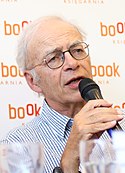Peter Singer Quote
The capacity for suffering – or more strictly, for suffering and/or enjoyment or happiness – is not just another characteristic like the capacity for language or for higher mathematics. Bentham is not saying that those who try to mark ‘the insuperable line’ that determines whether the interests of a being should be considered happen to have selected the wrong characteristic. The capacity for suffering and enjoying things is a prerequisite for having interests at all, a condition that must be satisfied before we can speak of interests in any meaningful way. It would be nonsense to say that it was not in the interests of a stone to be kicked along the road by a child. A stone does not have interests because it cannot suffer. Nothing that we can do to it could possibly make any difference to its welfare. A mouse, on the other hand, does have an interest in not being tormented, because mice will suffer if they are treated in this way.
The capacity for suffering – or more strictly, for suffering and/or enjoyment or happiness – is not just another characteristic like the capacity for language or for higher mathematics. Bentham is not saying that those who try to mark ‘the insuperable line’ that determines whether the interests of a being should be considered happen to have selected the wrong characteristic. The capacity for suffering and enjoying things is a prerequisite for having interests at all, a condition that must be satisfied before we can speak of interests in any meaningful way. It would be nonsense to say that it was not in the interests of a stone to be kicked along the road by a child. A stone does not have interests because it cannot suffer. Nothing that we can do to it could possibly make any difference to its welfare. A mouse, on the other hand, does have an interest in not being tormented, because mice will suffer if they are treated in this way.
Related Quotes
A premature death does not only rob one of the countless instances where one would have experienced pleasure, it also saves one from the innumerable instances where one would have experienced pain.
About Peter Singer
On two occasions, Singer served as chair of the philosophy department at Monash University, where he founded its Centre for Human Bioethics. In 1996 he stood unsuccessfully as a Greens candidate for the Australian Senate. In 2004 Singer was recognised as the Australian Humanist of the Year by the Council of Australian Humanist Societies. In 2005, The Sydney Morning Herald placed him among Australia's ten most influential public intellectuals. Singer is a cofounder of Animals Australia and the founder of the non-profit organization The Life You Can Save.
